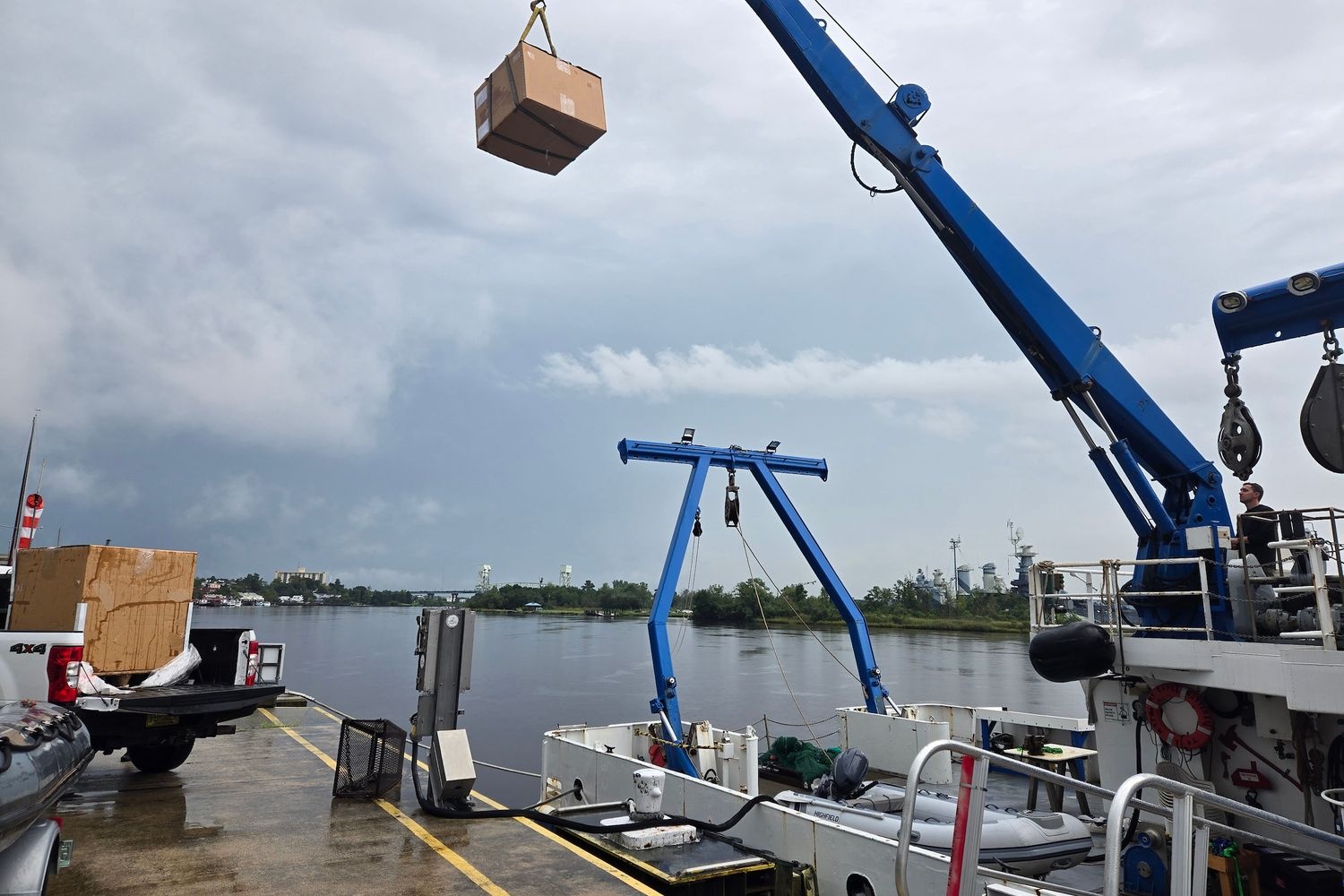TEAL-SHIPS researchers deploy ocean instruments during TEAL-3 cruise, capturing critical data as Hurricane Erin brushes past the NC coast

Courtesy: Ata Suanda/UNCW
UNC System Research Opportunities Initiative: Transect Expedition to Assess Land-to-Sea Habitats via Interdisciplinary Process Studies (TEAL-SHIPS) is a strategic partnership within the UNC System led by UNC Wilmington.
TEAL-SHIPS Cruise Returns to Wilmington
TEAL-SHIPS returned to Wilmington on Sunday after completing its most recent research cruise, called TEAL-3. The expedition was the third of eight offshore trips planned for the collaborative research initiative led by UNC Wilmington. During the three-and-a-half-day cruise, the team collected physical data and water samples as well as fish and zooplankton specimens across a transect from the mouth of the Cape Fear River to the Gulf Stream.
In addition to its standard data collection, the timing and strategic location of the TEAL-SHIPS expedition allowed the team to deploy instruments that provided valuable information about Hurricane Erin, which is brushing past the North Carolina coast this week. The team was operating about 200 kilometers from shore in a part of the Atlantic Ocean rarely visited by research vessels, providing a unique opportunity for collaboration.
We successfully collected physical data and water samples from all six major stations, as well as 10 intermediate minor stations spaced along the transect. From this, we learned that our proposed plan to finish the work in three-and-a-half days is doable barring major issues and is not too taxing on the science party or crew.
-Bradley Tolar, UNCW Biology and Marine Biology assistant professor and TEAL-SHIPS principal investigator
Tolar also said the third cruise aboard Cape Fear Community College’s (CFCC) R/V Cape Hatteras was the most successful since the project launched in February. TEAL-1 and TEAL-2, while also successful, faced weather and equipment problems.
“TEAL-3 lived up to its nickname, ‘Third Time’s the Charm’”
-Bradley Tolar
Partnerships and Drifter Deployment
Since spring, TEAL-SHIPS has partnered with the University of California San Diego (UCSD) Lagrangian Drifter Laboratory, utilizing its drifters (free-floating buoys that transmit their location via satellite) to study how coastal, Gulf Stream and deep ocean water masses mix, which is one of the key physical oceanographic questions of the TEAL-SHIPS program. As part of the collaboration, TEAL-SHIPS offered to deploy drifters on UCSD’s behalf. With the instruments in the water, researchers were able to collect data and learn more about Hurricane Erin before its impact was felt in Wilmington.
“The drifters we deployed are 150 to 200 kilometers offshore and will see these hurricane waves before they are felt at the coast. We deployed eight of them, and they are spreading out away from each other, providing a spatial and temporal picture of wave intensification.”
-Ata Suanda, UNCW Physics and Physical Oceanography associate professor
The measurements of waves and air pressure picked up by the drifters allow for real-time adjustments of computer models that forecast the path and strength of a hurricane or tropical storm. UNCW’s deployment of the drifters was covered by StormCenter Communications, a popular streaming and news channel that focuses on major weather events.
“The Global Drifter program relies on partners to deploy drifters at different locations. We were happy to be a platform of opportunity to deploy instruments on their behalf,” said Suanda. “This type of collaboration and coordination is fairly common, but the fortuitous timing of our cruise probably cannot be overstated. Gaining access to drifter data is also certainly an added benefit to TEAL-SHIPS.”
Looking Ahead to TEAL-4
The TEAL-3 cruise carried 27 people in total, including 17 members of the science party (faculty, postdoctoral students, graduate students, undergraduate students and a technician) along with the research vessel’s CFCC crew and two CFCC marine technology students. The TEAL-3 team represented UNCW, NC State University and East Carolina University, while also collecting samples for collaborators from UNC Chapel Hill and UNC Charlotte. In addition to Tolar and Suanda, UNCW TEAL-SHIPS faculty researchers include Assistant Professor Christian Briseño-Avena (Department of Biology and Marine Biology), Associate Professor Winifred Johnson (Department of Chemistry and Biochemistry) and Assistant Professor Matthew McLean (Department of Biology and Marine Biology).
TEAL-SHIPS’s fourth cruise is set to head back to the Gulf Stream in November, which will complete the first four seasons of the two-year project.
“We feel like we have a solid expedition plan after three cruises. We will continue that work on TEAL-4 and test out other methods. From the microbiology perspective, we will bring both of our large incubators to run some experiments with our collaborators, and otherwise we will be thrilled to get our last season sample of the year.
-Bradley Tolar
This article has the following tags: UNCW News Homepage Academics Innovation & Discovery Research & Innovation Area CMS - Center for Marine Science CSE - College of Science & Engineering


